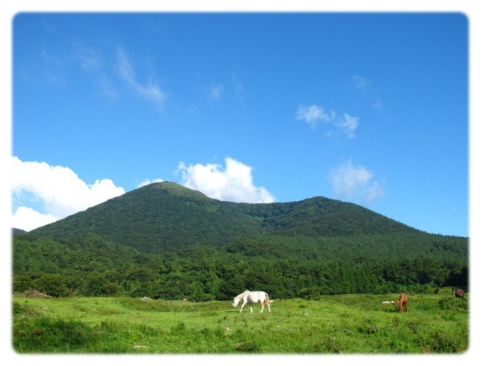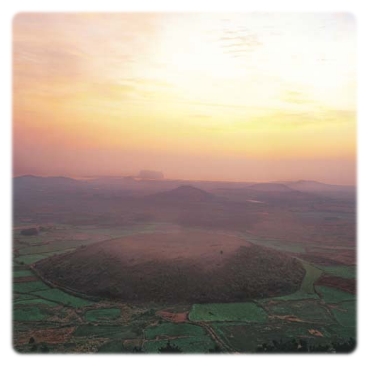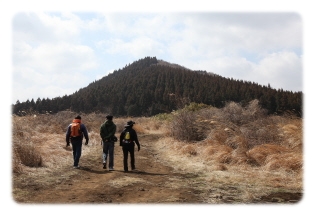Jeju Island gifted with nature sceneries and 1,700 species of plants, is a marvelous place where you can experience unique geographical features nowhere else can offer. In the center there is the proudly splendid Halla Mountain and neighboring oreums – low mountains of Jeju - reveals the original beauty of the geography of the volcanic island.
Oreum is a Jeju dialect for a low mountain. There are a good number of oreums as there is even a saying that people of Jeju are born from and returns to oreum after death. Near 380 of oreums are distributed in the island, which way exceeds 250 i.e. the number of those in Mt Etna of Italy.
Oreum consisted of grassland, natural and artificial forest, and wetland, is distributed intensively in the bottom area of Mt Halla and hilly and mountainous area. As the altitude of the areas differs the ecological variety is well preserved with high potential value. To be recognized as oreum the mountain should be qualified to have all required component i.e. a crater, shape, and contents; a crater formed by volcanic eruption; shapes of volcanic ashes and scoriae, and sedimentary layer; and pyroclastic materials. Also it is called as ‘ak’ or ‘bong’; Seongsan Ilchulbong, Dusanbong, Songaksan are some examples.
Oreums with different shapes and heights placed along by the ridges of Mt Halla and the coastline of the island invites you to the breathtaking beauty of the Mother Nature Jeju.
The ace view, Nokkome oreum

<Nokkomeoreum, where 112 families and 469 species of plants reside> (image: Official Blog of Jeju, New 7 Wonders)
Nokkomeoreum 833.8m above the sea level, covering an area of 923,692㎡ with the height of 234m, girth of4,390m, and a smaller Nokkomeoreum is also known as ‘brother oreum’ as a pair sitting next by each other. The two mountains stand in high spirits and its exploded crater area is enough to thrill your eyes. Some people are surprised as they think ‘Nokkome’ is Japanese but in fact it derives from a Korean expression! ‘Nopgome’ meaning ‘it is high.’
In the Nokkomeoreum area there are animal species that are protected species (class 2) by the Ministry of Environment including roe, weasel of Jeju, badger and so on. Endangered animals including birds such as goshawk, brown-eared bulbul, kestrel, bush warbler and Red-tongue pit-viper, takydromus wolteri and others are residing as well. Also there are 112 families and 469 species of plants e.g. nutmeg tree, hornbeam, andGaleola septentrionalis Reichb. For sure Nokkomeoreum area is some repository of various species of animals and plants.
If you follow the ridges of the hills a scenic panorama with different faces of Mt Halla and oreums is revealed. At the northern mountain top the view of Jeju city and the sea can be seen at a look. An average of 4~500 people on weekdays and 2~3,000 people on weekends visit the area to see this extraordinary scene. Why not check out Nokkomeoreum yourself and experience the grandeur gift of the nature?
The Queen of Oreum, Darangswioreum

<Darangswi oreum where ‘Wollangbong Sunrise Festival’ will be held next year> (image: Kyunghyang Shinmun)
Darangswi oreum representing Gujwa town is 382.4m above the sea level, covering an area of 800,463㎡with the height of 227m, and girth of 3,391m. It was named as so because of the crater of the mountain looks round as a moon (Darang sounds similar to ‘dal’ that is moon in Korean). Darangswi oreum is the pride of the villagers as it presents a uniquely beautiful scene for viewing the moon when the full moon rises behind the round crater of the oreum.
While most oreums have asymmetric slops, Darangswi oreum is a vertically balanced oval shape; this outstanding beauty of proportion surely gives a good reason for its title i.e. the ‘Queen of oreum.’
On top of the mountain, there is a funnel shape of huge circular crater. The circumference of the outside of crater is reaching 1,500m, and its depth is 115m just as deep as baekrokdam of Mt. Halla. The area is dense with weeds and cedars on its foot. The area is a huge grassland and if the weather is good, you can see theSeongsan Sunrise Hill, Udo and a wind power plant complex.
There is a saying that you didn’t see the real Jeju until climbing up Oreum., after the wood stairs toDarangswi oreum were built in 2005, the number of visitors increased. Why don’t you experience the ‘real’ Jeju at Darangswi oreum which is famous for paragliding and the annual Wallang hill Sunrise festival
Geomun Oreum listed on UNESCO’s World Cultural and Natural Heritage
Geomun Oreum listed on UNESCO’s World Cultural and Natural Heritage

<Geomun Oreum, which has Manjang Cave, Gotjawal, etc.>(Image : Korea Tourism Organizaion)
Geomun Oreum, which has the most beautiful scenery among all Oreums in Jeju, is 456.6 meters above sea level, 112 meters high, 4,553 meters in circumference, and 809,860㎡ in extent, which of name, Goemun, was originated from a bunch of trees in that Oreum makes black color. (i.e. Goemun means black in Korean.) Only 300 visitors a day are allowed to go in, and the advanced reservation two days before is a must. It has the longest lava canyon throughout Jeju and the treasure of nature, ‘Gotjawal’, which has a high value in terms of geology as well as ecology.
The crater seen from the top of Goemun oreum spewed out lava to the ocean and created over 20 lava caves around, such as Bengdui cave, Manjang cave, Kimnyeongsa cave, etc. As designated as a World Cultural and Natural Heritage by UNESCO, oreum has the representative lava caves of Jeju. Among these caves, onlyManjang cave is open to public. The course is flat and the passage is also wide that even the old and weak can look around without a big difficulty.
Al oreum is a paeasitic volcano that rose on the center of the crater of Geomun oreum. You can see 9 hills forming the Geomun oreum from the observatory which is 1km apart from the tour starting spot. In addition, the crater of Geomun oreum is 4 times larger than that of Mt Hall. You will be overwhelmed at the marvelous scenery of nature.
Before visiting Geomun oreum, the commentator for Natural Heritage gives several notices. You should wear the hiking boots, but not with the hiking stick. You can only bring a bottle of water.
No comments:
Post a Comment